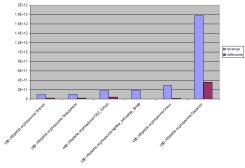There are a lot of fascinating podcasts of interviews out there. They’re usually done by phone, and because of the vagaries of the hardware and software that link up each caller’s voice to the host’s, different voices get added to a podcast MP3 at different volumes, especially in conference call panel discussions such as those for The Semantic Web Gang and ReadWriteTalk. These differences can lead to an annoying combination of blasting your ears (especially when using ear buds…
I recently had to analyze a large batch of SGML DTDs for a client who planned to convert their publishing system to XML. I was mostly looking for redundant declarations in multiple DTDs that could be pulled into shared modules, but I also wanted some lists of elements and attributes that I could compare against statistics compiled about sample data so that I could see which elements and attributes were actually being used, because there’s not much point converting SGML declarations for…
In an earlier project I did querying relational data with SPARQL, I wanted to demonstrate how adding OWL metadata made it possible to answer useful queries that couldn’t have been answered with just the original data. I did this using two simple databases of one table each, but recently, while helping someone who was also using the D2RQ interface to provide access to some relational data, I decided to get more comfortable with using SPARQL to query data from multi-table relational…
I recently wrote a white paper for Innodata Isogen titled Content Metadata Standards: Libraries, Publishers, and More that is available for free if you don’t mind registering first. (If you do register, you’ll find a nice choice of other white papers available on topics such as DITA, content re-use, and ebooks.)



